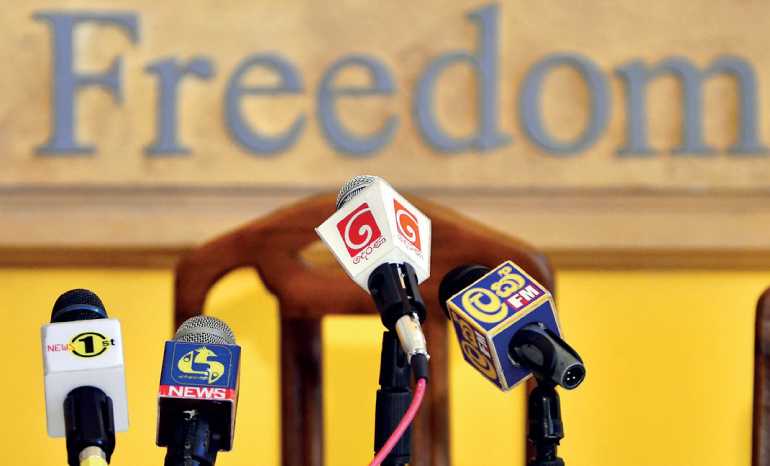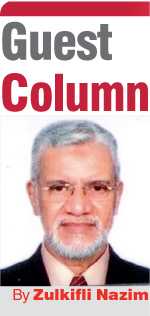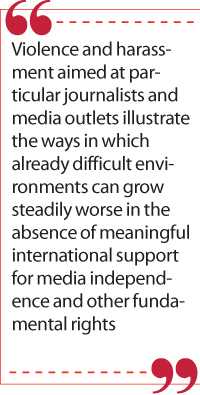Sunday Apr 20, 2025
Sunday Apr 20, 2025
Friday, 24 July 2020 00:10 - - {{hitsCtrl.values.hits}}

The erosion of press freedom is both a symptom of and a contributor to the breakdown of other democratic institutions and principles, a fact that makes it especially alarming – Pic by Shehan Gunasekara
Media freedom has been deteriorating around the world over the past decade. In some of the most influential democracies in the world, populist leaders have overseen concerted attempts to throttle the independence of the media sector. The fundamental right to seek and disseminate information through an independent press is under attack, and part of the assault has come from an unexpected source – the elected leaders. 
These are those who should be the staunchest defenders of press freedom; but quite regrettably to our consternation and dismay, they have made explicit attempts to silence critical media voices and strengthen outlets that serve up favourable coverage. The trend is linked to a global decline in democracy itself.
The erosion of press freedom is both a symptom of and a contributor to the breakdown of other democratic institutions and principles, a fact that makes it especially alarming.
Our bleak, unliveable and insufferable existence will be seen, when we are deprived of writing, speaking or expressing ourselves in any form. The life and work of writers facing this peril must be protected and is urgent, but along with that urgency we should remind ourselves that their absence, the choking off of a writer’s work, its cruel amputation, is of equal peril to us, the ordinary folk.
Because proclaiming the truth is trouble for the warmonger, the torturer, the corporate thief, the political hack, the corrupt justice system, and for a comatose public. It is also an inconvenience and a source of difficulty for the ignorant bully and the sly racist. And the efforts by powerful governments to censor, starve, regulate televising, broadcasts and annihilate such writings and writers are clear signs that something important has taken place.
So they resort to special methods which include surveillance, censorship, arrest, even slaughter of those writers and broadcasters informing and disturbing the public – these are: Writers – journalists, essayists, bloggers, poets, playwrights who can disturb the social comatose functions of the population.
Media accounts of reality have the potential to influence public opinion and decision making processes. Therefore who has and who does not have access to the media and can make their voice heard is a crucial question with serious political consequences.
The life and work of journalists are not a gift to mankind; they are its necessity.
On the other side of the coin we see in some of the most influential democracies in the world, large segments of the population are no longer receiving unbiased news and information. This is not because journalists are being thrown in jail, as might occur in authoritarian settings. Instead, the media have fallen prey to more nuanced efforts to throttle their independence. Common methods include government-backed ownership changes, regulatory and financial pressure, and public denunciations of honest journalists.
Governments have also offered proactive support to friendly outlets through measures such as lucrative state contracts, favourable regulatory decisions, and preferential access to state information. The goal is to make the press serve those in power rather than the public.
The problem has arisen in tandem with right-wing populism, which has undermined basic freedoms in many democratic countries. Populist leaders present themselves as the defenders of an aggrieved majority against liberal elites and ethnic minorities whose loyalties they question, and argue that the interests of the nation – as they define it – should override democratic principles like press freedom, transparency, and open debate.
Democracies in general are undergoing a decline in political rights and civil liberties. Certain government administrations in the world have had great success in snuffing out critical journalism, blazing a trail for populist forces elsewhere. 
Leaders in some countries have consolidated media ownership in the hands of their cronies, ensuring that the outlets with the widest reach support the government and smear its perceived opponents. Case in point – in Hungary, where the process has advanced much further, nearly 80% of the media are owned by government allies.
Our powerful neighbour – the Asian superpower – India, the world’s most populous democracy, has also started sending signals that holding the government accountable is not part of the responsibility of the press and other associated media. The ruling Bharatiya Janata Party has supported campaigns to discourage speech that is ‘anti-national’, and government-aligned thugs have raided critical journalists’ homes and offices.
The media has become widely flattering of Prime Minister Narendra Modi, who won the re-election, amid allegations that the government issues directives on how the press should cover his activities and intimidates journalists who push back. The Indian government has also been selective in the allocation of television licenses, effectively excluding unfriendly outlets from the airwaves.
Not forgetting of course the most concerning development of recent years, press freedom has come under unusual pressure in the United States as well – the world’s leading democratic power. Although key news organisations remain strong and continue to produce vigorous reporting on those in office, President Donald Trump’s continual vilification of the press has seriously exacerbated an ongoing erosion of public confidence in the mainstream media. Among other steps, the president has repeatedly threatened to strengthen libel laws, revoke the licenses of certain broadcasters, and damage other business interests of media owners.
The breakdown of global press freedom is closely related to the broader decline of democracy. Although the press is not always the first institution to be attacked when a country’s leadership takes an anti-democratic turn – repression of free media is a strong indication that other political rights and civil liberties are in danger. Assaults on media independence are frequently associated with power grabs by new or incumbent leaders, or with attempts of entrenched regimes, to crush perceived threats.
While populist leaders in democracies seek to secure and build on their gains by taming the press, established autocratic governments continue to tighten the screws on dissenting voices, as any breach in their media dominance threatens to expose official wrongdoing or debunk official narratives. In Russia, authorities moved to block the popular messaging application ‘Telegram’ after the company refused to hand over its encryption keys to security officials. The government in Cameroon shut down internet service in the restive Anglophone minority.
In Myanmar, two Reuter’s journalists were sentenced to seven years in prison after a flawed trial in which the court ignored plain evidence that they had been entrapped to halt their investigation of military atrocities against the Rohingya minority; although they were recently pardoned, they were not exonerated.
In Pakistan, security agents have allegedly warned journalists against coverage of taboo subjects, such as abuses by the military, or given reporters instructions on how to cover specific political issues. The regime in China has worked to close off the last remaining avenues for accessing uncensored information by increasing pressure on private technology companies to police the content on their platforms more persistently.
The 2018 murder of Jamal Khashoggi by Saudi interests was the most infamous recent case, but it was hardly unique. Also a Tanzanian journalist investigating the murders of local officials disappeared, and his fate remains a mystery. Sri Lanka too has had its fair share of accusations.
These downgrades in various countries can be attributed to a range of legal, political, and economic factors, but some stand out as more concerning and pervasive. Violence and harassment aimed at particular journalists and media outlets illustrate the ways in which already difficult environments can grow steadily worse in the absence of meaningful international support for media independence and other fundamental rights.
However, experience has shown, that press freedom can rebound from even lengthy stints of repression when given the opportunity. The basic desire for democratic liberties, including access to honest and fact-based journalism, can never be extinguished, and it is never too late to renew the demand that these rights be granted in full.
Discover Kapruka, the leading online shopping platform in Sri Lanka, where you can conveniently send Gifts and Flowers to your loved ones for any event including Valentine ’s Day. Explore a wide range of popular Shopping Categories on Kapruka, including Toys, Groceries, Electronics, Birthday Cakes, Fruits, Chocolates, Flower Bouquets, Clothing, Watches, Lingerie, Gift Sets and Jewellery. Also if you’re interested in selling with Kapruka, Partner Central by Kapruka is the best solution to start with. Moreover, through Kapruka Global Shop, you can also enjoy the convenience of purchasing products from renowned platforms like Amazon and eBay and have them delivered to Sri Lanka.
Discover Kapruka, the leading online shopping platform in Sri Lanka, where you can conveniently send Gifts and Flowers to your loved ones for any event including Valentine ’s Day. Explore a wide range of popular Shopping Categories on Kapruka, including Toys, Groceries, Electronics, Birthday Cakes, Fruits, Chocolates, Flower Bouquets, Clothing, Watches, Lingerie, Gift Sets and Jewellery. Also if you’re interested in selling with Kapruka, Partner Central by Kapruka is the best solution to start with. Moreover, through Kapruka Global Shop, you can also enjoy the convenience of purchasing products from renowned platforms like Amazon and eBay and have them delivered to Sri Lanka.